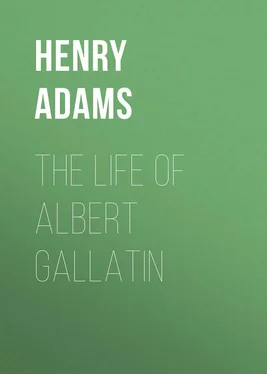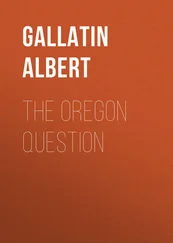Henry Adams - The Life of Albert Gallatin
Здесь есть возможность читать онлайн «Henry Adams - The Life of Albert Gallatin» — ознакомительный отрывок электронной книги совершенно бесплатно, а после прочтения отрывка купить полную версию. В некоторых случаях можно слушать аудио, скачать через торрент в формате fb2 и присутствует краткое содержание. Жанр: foreign_antique, foreign_prose, на английском языке. Описание произведения, (предисловие) а так же отзывы посетителей доступны на портале библиотеки ЛибКат.
- Название:The Life of Albert Gallatin
- Автор:
- Жанр:
- Год:неизвестен
- ISBN:нет данных
- Рейтинг книги:4 / 5. Голосов: 1
-
Избранное:Добавить в избранное
- Отзывы:
-
Ваша оценка:
- 80
- 1
- 2
- 3
- 4
- 5
The Life of Albert Gallatin: краткое содержание, описание и аннотация
Предлагаем к чтению аннотацию, описание, краткое содержание или предисловие (зависит от того, что написал сам автор книги «The Life of Albert Gallatin»). Если вы не нашли необходимую информацию о книге — напишите в комментариях, мы постараемся отыскать её.
The Life of Albert Gallatin — читать онлайн ознакомительный отрывок
Ниже представлен текст книги, разбитый по страницам. Система сохранения места последней прочитанной страницы, позволяет с удобством читать онлайн бесплатно книгу «The Life of Albert Gallatin», без необходимости каждый раз заново искать на чём Вы остановились. Поставьте закладку, и сможете в любой момент перейти на страницу, на которой закончили чтение.
Интервал:
Закладка:
Of the nature of Albert’s training the best idea can be got from his own account of the Academy of Geneva, contained in a letter written in 1847 and published among his works. 3 3 Letter to Eben Dodge, 21st January, 1847. Writings, vol. ii. p. 638.
At that time the academy represented all there was of education in the little republic, and its influence was felt in every thought and act of the citizens. “In its organization and general outlines the academy had not, when I left Geneva in 1780, been materially altered from the original institutions of its founder. Whatever may have been his defects and erroneous views, Calvin had at all events the learning of his age, and, however objectionable some of his religious doctrines, he was a sincere and zealous friend of knowledge and of its wide diffusion among the people. Of this he laid the foundation by making the whole education almost altogether gratuitous, from the A B C to the time when the student had completed his theological or legal studies. But there was nothing remarkable or new in the organization or forms of the schools. These were on the same plan as colleges were then, and generally continue to be in the old seminaries of learning… In the first place, besides the academy proper, there was a preparatory department intimately connected with it and under its control. This in Geneva was called ‘the College,’ and consisted of nine classes, … the three lower of which, for reading, writing, and spelling, were not sufficient for the wants of the people, and had several succursales or substitutes in various parts of the city. But for that which was taught in the six upper classes (or in the academy), there were no other public schools but the college and the academy. In these six classes nothing whatever was taught but Latin and Greek, – Latin thoroughly, Greek much neglected. Professor de Saussure used his best endeavors about 1776, when rector of the academy, to improve the system of education in the college by adding some elementary instruction in history, geography, and natural science, but could not succeed, a great majority of his colleagues opposing him…
“When not aided and stimulated by enlightened parents or friends, the students from the time when they entered the academy (on an average when about or rather more than fifteen years old) were left almost to themselves, and studied more or less as they pleased. But almost all had previously passed through at least the upper classes of the college. I was the only one of my class and of the two immediately preceding and following me who had been principally educated at home and had passed only through the first or upper class of the college… In the years 1775-1779 the average number of the scholars in the four upper classes of the college was about one hundred, and that of the students in the four first years of the academical course, viz., the auditoires of belles-lettres and philosophy, about fifty, of whom not more than one or two had not passed through at least the three or four upper classes of the college. Very few mechanics, even the watchmakers, so numerous in Geneva and noted for their superior intelligence and knowledge, went beyond the fifth and sixth classes, which included about one hundred and twenty scholars. As to the lower or primary classes or schools, it would have been difficult to find a citizen intra muros who could not read and write. The peasantry or cultivators of the soil in the small Genevese territory were, indeed, far more intelligent than their Catholic neighbors, but still, as in the other continental parts of Europe, a distinct and inferior class, with some religious instruction, but speaking patois (the great obstacle to the diffusion of knowledge), and almost universally not knowing how to read or to write. The population intra muros was about 24,000 (in 1535, at the epoch of the Reformation and independence, about 13,000), of whom nearly one third not naturalized, chiefly Germans or Swiss, exercising what were considered as lower trades, tailors, shoemakers, &c., and including almost all the menial servants. I never knew or heard of a male citizen or native of Geneva serving as such. The number of citizens above twenty-five years of age, and having a right to vote, amounted, exclusively of those residing abroad, to 2000…
“There was in Geneva neither nobility nor any hereditary privilege but that of citizenship; and the body of citizens assembled in Council General had preserved the power of laying taxes, enacting laws, and ratifying treaties. But they could originate nothing, and a species of artificial aristocracy, composed of the old families which happened to be at the head of affairs when independence was declared, and skilfully strengthened by the successive adoption of the most distinguished citizens and emigrants, had succeeded in engrossing the public employments and concentrating the real power in two self-elected councils of twenty-five and two hundred members respectively. But that power rested on a most frail foundation, since in a state which consists of a single city the majority of the inhabitants may in twenty-four hours overset the government. In order to preserve it, a moral, intellectual superiority was absolutely necessary. This could not be otherwise attained than by superior knowledge and education, and the consequence was that it became disgraceful for any young man of decent parentage to be an idler. All were bound to exercise their faculties to the utmost; and although there are always some incapable, yet the number is small of those who, if they persevere, may not by labor become, in some one branch, well-informed men. Nor was that love and habit of learning long confined to that self-created aristocracy. A salutary competition in that respect took place between the two political parties, which had a most happy effect on the general diffusion of knowledge.
“During the sixteenth and the greater part of the seventeenth century the Genevese were the counterpart of the Puritans of Old and of the Pilgrims of New England, – the same doctrines, the same simplicity in the external forms of worship, the same austerity of morals and severity of manners, the same attention to schools and seminaries of learning, the same virtues, and the same defects, – exclusiveness and intolerance, equally banishing all those who differed on any point from the established creed, putting witches to death, &c., &c. And with the progress of knowledge both about at the same time became tolerant and liberal. But here the similitude ends. To the Pilgrims of New England, in common with the other English colonists, the most vast field of enterprise was opened which ever offered itself to civilized man. Their mission was to conquer the wilderness, to multiply indefinitely, to settle and inhabit a whole continent, and to carry their institutions and civilization from the Atlantic to the Pacific Ocean. With what energy and perseverance this has been performed we all know. But to those pursuits all the national energies were directed. Learning was not neglected; but its higher branches were a secondary object, and science was cultivated almost exclusively for practical purposes, and only as far as was requisite for supplying the community with the necessary number of clergymen and members of the other liberal professions. The situation of Geneva was precisely the reverse of this. Confined to a single city and without territory, its inhabitants did all that their position rendered practicable. They created the manufacture of watches, which gave employment to near a fourth part of the population, and carried on commerce to the fullest extent of which their geographical situation was susceptible. But the field of active enterprise was still the narrowest possible. To all those who were ambitious of renown, fame, consideration, scientific pursuits were the only road that could lead to distinction, and to these, or other literary branches, all those who had talent and energy devoted themselves.
Читать дальшеИнтервал:
Закладка:
Похожие книги на «The Life of Albert Gallatin»
Представляем Вашему вниманию похожие книги на «The Life of Albert Gallatin» списком для выбора. Мы отобрали схожую по названию и смыслу литературу в надежде предоставить читателям больше вариантов отыскать новые, интересные, ещё непрочитанные произведения.
Обсуждение, отзывы о книге «The Life of Albert Gallatin» и просто собственные мнения читателей. Оставьте ваши комментарии, напишите, что Вы думаете о произведении, его смысле или главных героях. Укажите что конкретно понравилось, а что нет, и почему Вы так считаете.












